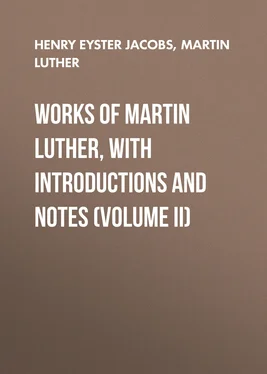Henry Eyster Jacobs - Works of Martin Luther, with Introductions and Notes (Volume II)
Здесь есть возможность читать онлайн «Henry Eyster Jacobs - Works of Martin Luther, with Introductions and Notes (Volume II)» — ознакомительный отрывок электронной книги совершенно бесплатно, а после прочтения отрывка купить полную версию. В некоторых случаях можно слушать аудио, скачать через торрент в формате fb2 и присутствует краткое содержание. Жанр: foreign_prose, foreign_religion, Философия, foreign_psychology, foreign_antique, на немецком языке. Описание произведения, (предисловие) а так же отзывы посетителей доступны на портале библиотеки ЛибКат.
- Название:Works of Martin Luther, with Introductions and Notes (Volume II)
- Автор:
- Жанр:
- Год:неизвестен
- ISBN:нет данных
- Рейтинг книги:3 / 5. Голосов: 1
-
Избранное:Добавить в избранное
- Отзывы:
-
Ваша оценка:
- 60
- 1
- 2
- 3
- 4
- 5
Works of Martin Luther, with Introductions and Notes (Volume II): краткое содержание, описание и аннотация
Предлагаем к чтению аннотацию, описание, краткое содержание или предисловие (зависит от того, что написал сам автор книги «Works of Martin Luther, with Introductions and Notes (Volume II)»). Если вы не нашли необходимую информацию о книге — напишите в комментариях, мы постараемся отыскать её.
Works of Martin Luther, with Introductions and Notes (Volume II) — читать онлайн ознакомительный отрывок
Ниже представлен текст книги, разбитый по страницам. Система сохранения места последней прочитанной страницы, позволяет с удобством читать онлайн бесплатно книгу «Works of Martin Luther, with Introductions and Notes (Volume II)», без необходимости каждый раз заново искать на чём Вы остановились. Поставьте закладку, и сможете в любой момент перейти на страницу, на которой закончили чтение.
Интервал:
Закладка:
Only think of it yourself! They must confess that there are pious Christians among us, who have the true faith, Spirit, understanding, word and mind of Christ. Why, then, should we reject their word and understanding and follow the pope, who has neither faith nor Spirit? That would be to deny the whole faith and the Christian Church. Moreover, it is not the pope alone who is always in the right, if the article of the Creed is correct: "I believe one holy Christian Church"; otherwise the prayer must run: "I believe in the pope at Rome," and so reduce the Christian Church to one man,—which would be nothing else than a devilish and hellish error.
Besides, if we are all priests, as was said above 131 131 Pp. 66 ff.
, and all have one faith, one Gospel, one sacrament, why should we not also have the power to test and judge what is correct or incorrect in matters of faith? What becomes of the words of Paul in I Corinthians ii: "He that is spiritual judgeth all things, yet he himself is judged of no man," [1 Cor. 2:15] and II Corinthians iv: "We have all the same Spirit of faith"? [2 Cor. 4:13] Why, then, should not we perceive what squares with faith and what does not, as well as does an unbelieving pope?
All these and many other texts should make us bold and free, and we should not allow the Spirit of liberty, as Paul calls Him [2 Cor. 3:17], to be frightened off by the fabrications of the popes, but we ought to go boldly forward to test all that they do or leave undone, according to our interpretation of the Scriptures, which rests on faith, and compel them to follow not their own interpretation, but the one that is better. In the olden days Abraham had to listen to his Sarah, although she was in more complete subjection to him than we are to anyone on earth [Gen. 21:12]. Balaam's ass, also, was wiser than the prophet himself [Num. 22:28]. If God then spoke by an ass against a prophet, why should He not be able even now to speak by a righteous man against the pope? In like manner St. Paul rebukes St. Peter as a man in error [Gal. 2:11 ff.]. Therefore it behooves every Christian to espouse the cause of the faith, to understand and defend it, and to rebuke all errors.
[Sidenote: The Third Wall—Pope and Council]
The third wall falls of itself when the first two are down. For when the pope acts contrary to the Pope and Scriptures, it is our duty to stand by the Scriptures, to reprove him, and to constrain him, according to the word of Christ in Matthew xviii: "If thy brother sin against thee, go and tell it him between thee and him alone; if he hear thee not, then take with thee one or two more; if he hear them not, tell it to the Church; if he hear not the Church, consider him a heathen." [Matt. 18:15] Here every member is commanded to care for every other. How much rather should we do this when the member that does evil is a ruling member, and by his evil-doing is the cause of much harm and offence to the rest! But if I am to accuse him before the Church, I must bring the Church together.
They have no basis in Scripture or their contention that it belongs to the pope alone to call a council or confirm its actions 132 132 Another contention of Prierias. In 1518 (Nov. 25th) Luther had appealed his cause from the decision of the pope, which he foresaw would be adverse, to the decision of a council to be held at some future time. In the Epitome Prierias discusses this appeal, asserting, among other things, that "when there is one undisputed pontiff, it belongs to him alone to call a council," and that "the decrees of councils neither bind nor hold ( nullum ligant vel astringunt ) unless they are confirmed by authority of the Roman pontiff" ( Weimar Ed. , VI, 335).
; for this is based merely upon their own laws, which are valid only in so far as they are not injurious to Christendom or contrary to the laws of God. When the pope deserves punishment, such laws go out of force, since it is injurious to Christendom not to punish him by means of a council.
Thus we read in Acts xv. that it was not St. Peter who called the Apostolic Council, but the Apostles and elders [Acts 15:6]. If, then, that right had belonged to St. Peter alone, the council would not have been a Christian council, but an heretical conciliabulum 133 133 i. e., A mere gathering of people.
. Even the Council of Nicæa—the most famous of all—was neither called nor confirmed by the Bishop of Rome, but by the Emperor Constantine 134 134 The Council of Nicæa, the first of the great councils of the Church, assembled in 325 for the settlement of the Arian controversy. Luther's statement that it was called by the Emperor Constantine, and that its decisions did not derive their validity from any papal confirmation, is historically correct. On Luther's statements about this council, see _Schäffer, Luther als Kirchenhistoriker , pp. 291 ff.; Kohler, Luther und die Kg., pp. 148 ff.
, and many other emperors after him did the like, yet these councils were the most Christian of all 135 135 Luther is here referring to the earlier so-called "ecumenical" councils.
. But if the pope alone had the right to call councils, then all these councils must have been heretical. Moreover, if I consider the councils which the pope has created, I find that they have done nothing of special importance.
Therefore, when necessity demands, and the pope is an offence to Christendom, the first man who is able should, as a faithful member of the whole body, do what he can to bring about a truly free council 136 136 i. e., A council which will not be subject to the pope. Cf. Erl. Ed. , xxvi, 112.
. No one can do this so well as the temporal authorities, especially since now they also are fellow-Christians, fellow-priests, "fellow-spirituals," 137 137 i. e., They belong to the "spiritual estate"; see above, p. 69.
fellow-lords over all things, and whenever it is needful or profitable, they should give free course to the office and work in which God has put them above every man. Would it not be an unnatural thing, if a fire broke out in a city, and everybody were to stand by and let it burn on and on and consume everything that could burn, for the sole reason that nobody had the authority of the burgomaster, or because, perhaps, the fire broke out in the burgomaster's house? In such case is it not the duty of every citizen to arouse and call the rest? How much more should this be done in the spiritual city of Christ, if a fire of offence breaks out, whether in the papal government, or anywhere else? In the same way, if the enemy attacks a city, he who first rouses the others deserves honor and thanks; why then should he not deserve honor who makes known the presence of the enemy from hell, and awakens the Christians, and calls them together?
But all their boasts of an authority which dare not be opposed amount to nothing after all. No one in Christendom has authority to do injury, or to forbid the resisting of injury. There is no authority in the Church save for edification. Therefore, if the pope were to use his authority to prevent the calling of a free council, and thus became a hindrance to the edification of the Church, we should have regard neither or him nor or his authority; and if he were to hurl his bans and thunderbolts, we should despise his conduct as that of a madman, and relying on God, hurl back the ban on him, and coerce him as best we could. For this presumptuous authority of his is nothing; he has no such authority, and he is quickly overthrown by a text of Scripture; for Paul says to the Corinthians, "God has given us authority not for the destruction, but for the edification of Christendom." [2 Cor. 10:8] Who is ready to overleap this text? It is only the power of the devil and of Antichrist which resists the things that serve or the edification of Christendom; it is, therefore, in no wise to be obeyed, but is to be opposed with life and goods and all our strength.
Читать дальшеИнтервал:
Закладка:
Похожие книги на «Works of Martin Luther, with Introductions and Notes (Volume II)»
Представляем Вашему вниманию похожие книги на «Works of Martin Luther, with Introductions and Notes (Volume II)» списком для выбора. Мы отобрали схожую по названию и смыслу литературу в надежде предоставить читателям больше вариантов отыскать новые, интересные, ещё непрочитанные произведения.
Обсуждение, отзывы о книге «Works of Martin Luther, with Introductions and Notes (Volume II)» и просто собственные мнения читателей. Оставьте ваши комментарии, напишите, что Вы думаете о произведении, его смысле или главных героях. Укажите что конкретно понравилось, а что нет, и почему Вы так считаете.












